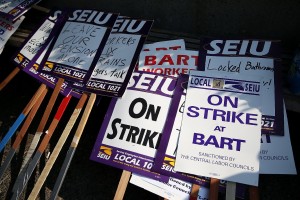
Update 10:45 a.m. Friday: BART and its two largest unions are resuming contract talks in Oakland as the clock counts down on a Sunday night strike deadline.
In a sign that political pressure may be building to solve the deadlock between the transit agency and the unions representing train operators, station agents, and other workers, San Francisco Mayor Ed Lee and California Labor Secretary Marty Morgenstern held a joint appearance at City Hall today. Both urged the agency and its workers to settle their dispute and warned a walkout, the second in five weeks, would impose hardships on many Bay Area residents. However, Lee gave no sign that he planned to try to intervene in the dispute.
And in one potentially positive sign, Josie Mooney, a negotiator SEIU Local 1021's BART chapter, said BART had made new proposals late Thursday. She called the development encouraging but declined to give details, citing a mediator’s gag order on the talks.
Two polls published Friday—one each from KPIX and the business-sponsored Bay Area Council—suggest the public strongly opposes a strike and believes management has made a stronger case in a dispute that centers on pay, pension and benefits.
The impasse came into sharp relief Thursday as the Amalgamated Transit Union Local 1555 and the BART chapter of SEIU Local 1021 issued a 72-hour strike notice Thursday. (A third unit, AFSCME Local 3993, which represent 200 BART supervisors, also says it will walk out.) A strike would shut down transit on Monday and force about 200,000 riders to seek alternate transporation.